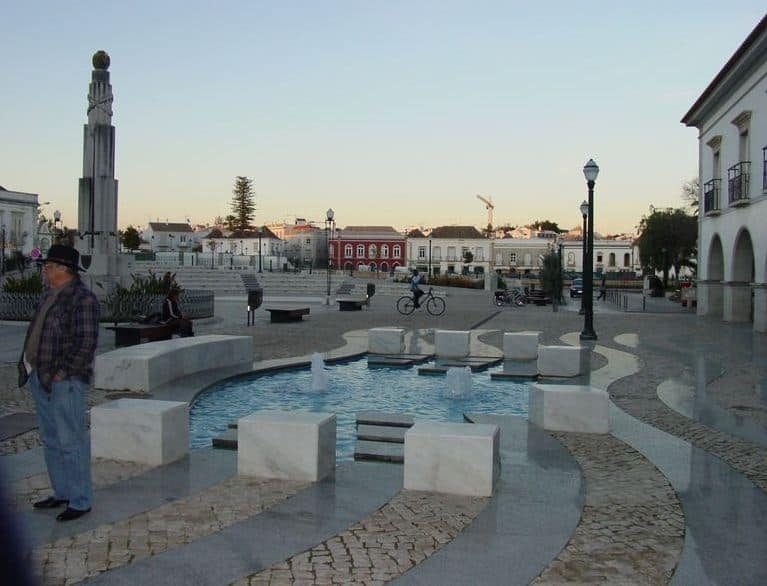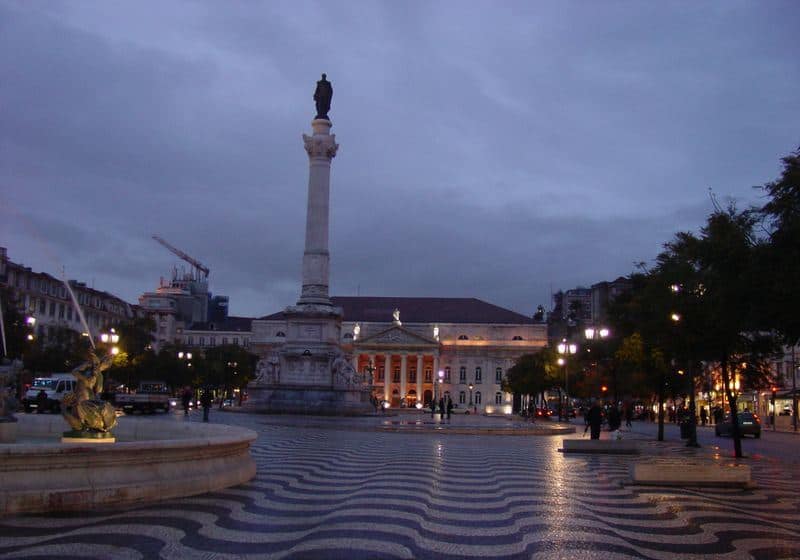The pavers in Portugal varied from “I can’t believe she is walking on this in high heels” to exquisite works of art and craftsmanship.
Every sidewalk and Praca (plaza) has it. It’s approximately 2 X 2 inches set in a bed of coarse sand with no mortar at all. The pavers settle, twist and buckle and puddles quickly form during rain storms. The pavers are easily lifted by tree roots and the spaces between the pavers are large enough to swallow the point of a high heel. To top it off Lisbon is a very hilly city! The residents were great walkers, you would be too if this was where you walked all of the time. Renovating this paving is a full time job.
Most of the paving in entrance areas like this was set more carefully, still no mortar, but more thoroughly compacted. This is crucial in installing any paver, there must be a deep enough bed of roadbase and sand under the pavers, 6″-8″ for patios and walkways, and 12″-18″ under driveways. The base must be compacted in layers, usually with a vibra-plate compactor. The entire patio must be compacted again after the pavers are installed and the sand has been broomed into the spaces between. If done properly it should last for years.
Here the colors separate pedestrians from auto traffic, never mind her walking in the street. In case you still didn’t understand, bollards alternating with Windmill Palms were installed to leave no doubt. The elliptical shapes are modifications of the waves in the next photo.
It looks like the paving undulates. Allot of the new paving in Portugal is being done in this pattern, the lack of straight rows should more thoroughly lock the pavers together. This pattern is inspired by the famous Brazilian Landscape Architect Roberto Burle Marx whose Copacabana Esplanade in Rio de Janeiro goes on for miles and was itself inspired by the ocean waves.
You really don’t see much concrete paving throughout Europe. I was surprised to see this brand new concrete paving abutting an old fortress along the Atlantic, I didn’t think it blended very well with the fortress, but it may have been part of protecting the foundation of the old fortress.
The use of three colors of pavers in this repetitive fashion is wonderful. It has a very dynamic flow to it and later in the day this was a very lively place to be, even in January.
It’s really not that large but because of the diamond pattern your eye follows the diagonal lines and the praca feels larger than it is. Your perspective also changes as you move across the praca.

Notice the intricacy evident in both the tile patterns, the iron work in the gate and the masonry wall beyond.
These design patterns are evident throughout southern Portugal and remind me of the much more detailed patterns you see in Andalusia, Spain. Since both areas were under Moorish rule for close to seven centuries they have similar design influences.
The curving perimeter lines are accentuated by the thick, dark bands mirroring them. They lead both into and out of this park. The curving red bench further emphasizes the flow of energy through this space. This dynamism created a space that didn’t feel welcoming and no one was in this park. Or maybe it was the benches.
As you move through this space and view the pond from different angles, the pond appears to tilt towards one side or another, even though the water line is obviously level. I love that in Portugal designers like to play with perception.
Now what were waves appear to be ripples in the pond caused by the marble “boulders”. I think it is fascinating how they try to blend contemporary designs with existing architecture. I love how the waves are integrated with the arches.
This is a flat space. One could almost experience vertigo walking across this praca. It is a popular area at night and the bar traffic spills into the area. It must be a fun experience while under the influence!
In this view of Praca de Dom Pedro IV the wave pattern is so pronounced that the pavers look almost like someone has grabbed the side of the praca and given it a snap, like a blanket or tablecloth. It has a magical, surreal effect at night.














Follow Us!